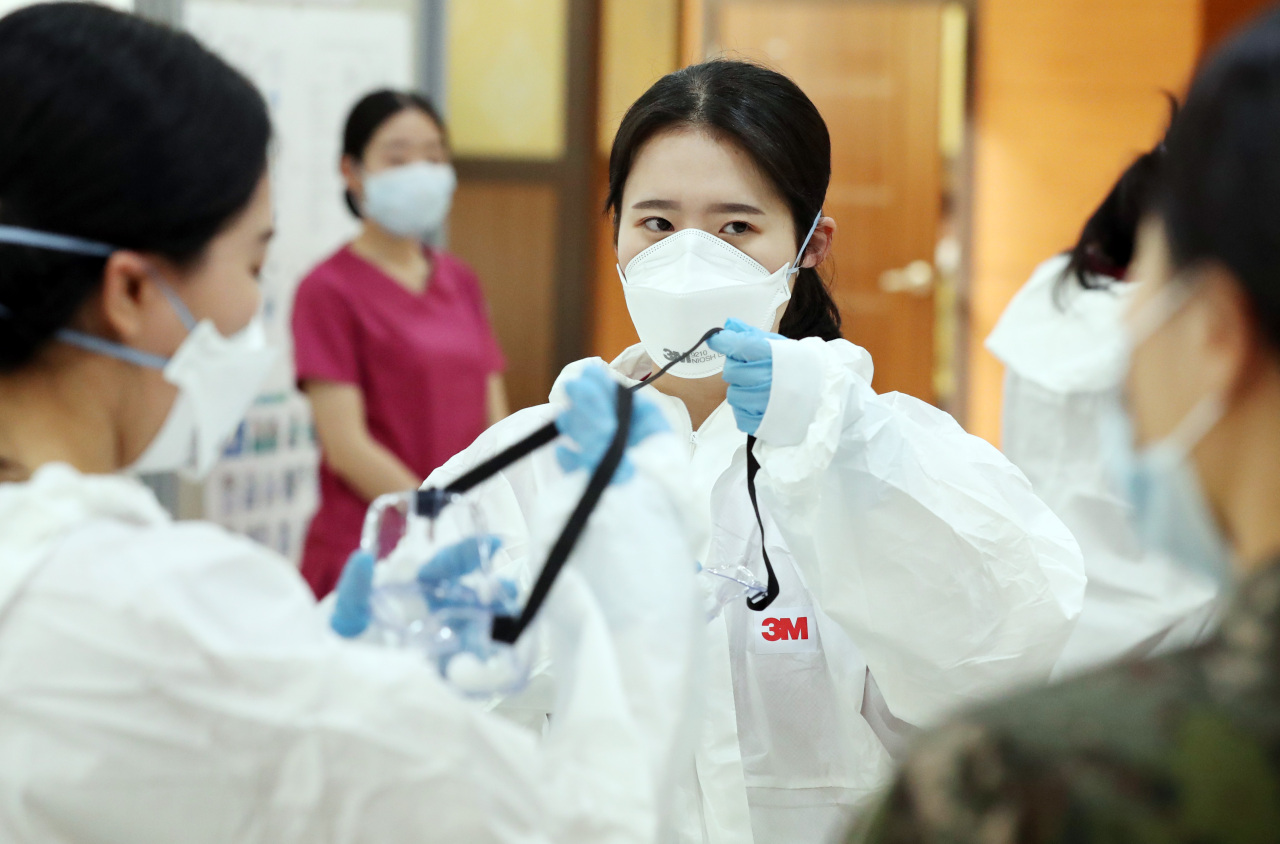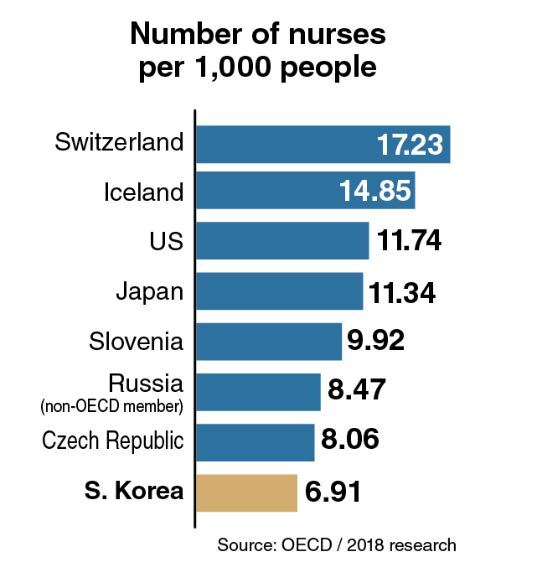[News Focus] Compared with other OECD nations, Korea has far fewer doctors, nurses, per 1,000 people
But Korea is No. 2 in number of hospital beds, despite quarantine infrastructure gaps in Daegu
By Kim Yon-sePublished : March 3, 2020 - 11:39

SEJONG -- South Korean health care workers are suffering the effects of severe overwork from taking care of an exponentially increasing number of COVID-19 patients.
More and more doctors and nurses from across the country are volunteering to join emergency medical teams serving the Yeongnam area, which encompasses Daegu and neighboring North Gyeongsang Province, where the highest and second-highest numbers of infections with the new coronavirus disease have been reported among the nation’s eight major cities and nine provinces so far.
International comparison data from the Organization for Economic Cooperation and Development showed that Korea lags far behind most OECD member nations, as well as some nonmembers, in the proportion of doctors to the general population.
In 2018, Korea ranked 30th of 35 countries (30 of the 36 OECD members plus five other major economies) with 2.34 medical doctors per 1,000 people. This means doctors comprised only 0.234 percent of the population. Of the 30 member countries the OECD looked at, Korea ranked 29th.
Many emerging economies were ahead of Korea in this respect. Russia had 4.04 doctors per 1,000 people, placing seventh on the list, whereas Slovakia stood at 14th with 3.42, Hungary at 17th with 3.32, Israel 20th with 3.14, Mexico and Japan tied for 27th with 2.43 and Poland 29th with 2.38.
Austria topped the list with 5.18 doctors per 1,000 people, and proportions were relatively high in Nordic and Baltic nations as well. Norway ranked second at 4.82 per 1,000, Lithuania third at 4.56, Sweden sixth at 4.12, Denmark eighth at 4.0, Estonia 13th at 3.47 and Latvia 18th at 3.21.

Among English-speaking countries, Australia ranked 12th with 3.68 whereas New Zealand ranked 16th with 3.33. The UK ranked 24th with 2.85 and Canada 25th with 2.76. The US was in 26th place with 2.61.
China, where the novel coronavirus originated, was 32nd on the list with 2.01 doctors per 1,000 people. Italy, where the COVID-19 epidemic has also had a severe impact, was in ninth place with 3.99.
As of Tuesday, China, Korea, Italy, Iran and Japan were the top five countries in terms of number of coronavirus infections. Korea had 4,812 cases and 29 deaths, making it the world’s worst-affected country outside China.
In a similar vein, the OECD looked at the proportion of nurses to the general population in 38 major countries -- 32 members plus six nonmembers.
Of all 38 countries studied, Korea ranked 21st with 6.91 nurses per 1,000 people, meaning nurses were 0.691 percent of the population. Of the 32 OECD members included in the analysis, Korea was 20th.
This figure far falls behind the proportion of nurses in Norway, which was first on the list with 17.81 per 1,000. Switzerland stood at No. 2 with 17.23, Iceland at No. 3 with 14.85, Germany at No. 4 with 12.93, Ireland at No. 5 with 12.16 and the US at No. 6 with 11.74.
Japan ranked ninth with 11.34, followed by Belgium (10th) with 10.96 France (12th) with 10.80, Slovenia (16th) with 9.92, Russia (17th) with 8.47, the Czech Republic (18th) with 8.06 and the UK (19th) with 7.80.
In contrast, Korea ranked second among the OECD members in the number of hospital beds per 1,000 inhabitants, with 12.27. But some of the nation’s metropolitan cities and provinces are suffering shortages of quarantine beds for coronavirus-infected patients.
Some coronavirus-positive patients in Daegu and North Gyeongsang Province died while waiting for spots in hospitals, because the two regions had vastly insufficient numbers of isolated hospital beds as well as the state-of-the-art quarantine hospital beds that were introduced here after the Middle East respiratory syndrome crisis of 2015.
Japan topped the list with 13.05 hospital beds, while the figures for China and Italy stood at 4.34 and 3.18. The figure for the US was especially low at 2.77, followed by New Zealand at 2.61, the UK at 2.54 and Canada at 2.50.
Meanwhile, devotees of a religious sect known as Shincheonji must be held accountable for the recent surge in the number of patients in the Daegu-North Gyeongsang area, online commenters say. They made up a significant portion of the 4,812 infections reported as of Tuesday. Some politicians from the ruling Democratic Party of Korea are looking into alleged misconduct on the part of Shincheonji’s leaders and its membership.
But the majority of Koreans share the view that a more critical factor is the lukewarm nature of the countermeasures taken by President Moon Jae-in, with many denouncing him for not issuing an entry ban on travelers from parts of China other than Hubei province.
“Doctors and nurses are engaging in desperate struggles to save patients. In contrast, President Moon has been conducting humiliating diplomacy versus China and Xi Jinping over the past month,” said an online commenter.
“It is lamentable that Moon has belatedly ordered ministers to secure masks for Koreans after donating 3 million masks (including 1 million for medical purposes) and 100,000 hazmat suits to the Chinese,” a commenter said.
By Kim Yon-se (kys@heraldcorp.com)




![[Herald Interview] 'Amid aging population, Korea to invite more young professionals from overseas'](http://res.heraldm.com/phpwas/restmb_idxmake.php?idx=644&simg=/content/image/2024/04/24/20240424050844_0.jpg&u=20240424200058)












![[KH Explains] Korean shipbuilding stocks rally: Real growth or bubble?](http://res.heraldm.com/phpwas/restmb_idxmake.php?idx=652&simg=/content/image/2024/04/25/20240425050656_0.jpg&u=)

